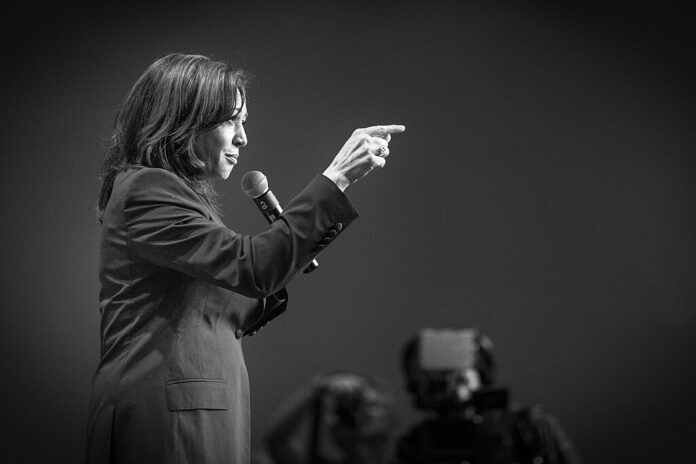Vice President Kamala Harris secures the democratic nomination with a forceful address, contrasting her policy vision with Donald Trump and addressing key issues like the Gaza conflict and domestic reforms
At the Democratic National Convention in Chicago on August 23, 2024, Vice President Kamala Harris gave a commanding speech that marked her formal acceptance of the Democratic presidential nomination. As the convention concluded, Harris, 59, presented herself as a decisive and pragmatic leader, drawing a stark contrast with her Republican rival, Donald Trump.
Harris’s address highlighted her commitment to defending democracy and confronting tyranny on the global stage. She emphasized her support for NATO and Ukraine while vowing to stand firm against Russian President Vladimir Putin’s aggression. Harris framed her candidacy as a bulwark against authoritarian regimes, directly challenging Trump’s foreign policy, which she criticized for being lenient towards dictators.
Embed from Getty ImagesEmerging as the Democratic candidate only a month ago, Harris faced the challenge of solidifying her position amid a rapidly shifting political landscape. President Joe Biden’s unexpected withdrawal paved the way for Harris, who took the opportunity to lay out her vision for the nation. Her speech addressed criticisms of her foreign policy record and aimed to reassure voters of her readiness to lead.
A significant portion of Harris’s speech focused on the ongoing Gaza conflict. Despite facing criticism from Palestinian supporters who felt sidelined, Harris affirmed her commitment to Israel’s security while calling for a resolution that would also allow Palestinians their right to self-determination. “Now is the time to get a hostage deal and a ceasefire deal done,” she declared, promising to work towards peace while ensuring Israel’s right to defend itself.
Domestically, Harris promised to push for tax reforms that would benefit the middle class, contrasting her plans with Trump’s proposals. She pledged to cut middle-class taxes and address housing shortages, fight price gouging, and uphold abortion rights. Her campaign has proposed raising the corporate tax rate from 21% to 28%, positioning her as a defender of economic fairness.
The speech, delivered at Chicago’s United Center, energized the crowd of 23,500 attendees, filling the arena to capacity. Harris’s enthusiastic post-speech comments, “We did it,” captured the mood of optimism and readiness for the final push towards Election Day.
Trump responded to Harris’s speech with a series of critical posts on Truth Social, labelling her as incompetent and weak. Despite this, Harris’s address aimed to solidify her image as a strong, principled leader prepared to tackle both domestic and international challenges.
Analysis:
Political Perspective: Harris’s speech at the Democratic National Convention solidified her position as the Democratic nominee and set the tone for the upcoming election against Trump. By contrasting her policies with Trump’s, she aimed to attract undecided voters and reinforce the Democratic party’s stance on key issues. Her commitment to international alliances and criticism of Trump’s foreign policy may resonate with voters concerned about global stability. Additionally, her focus on domestic reforms such as tax cuts and housing affordability could appeal to middle-class voters looking for tangible changes.
Social Perspective: Harris’s address reflects ongoing societal debates about the role of the U.S. in international conflicts and domestic economic inequality. Her balanced approach to the Gaza conflict, promising both support for Israel and a path to Palestinian self-determination, attempts to address the complex and polarized opinions on U.S. foreign policy. Domestically, her focus on issues like abortion rights and price gouging addresses public concerns about economic fairness and social justice, mirroring broader societal movements advocating for equity and reform.
Racial Perspective: As the first female Black and South Asian Vice President nominee, Harris’s candidacy carries significant racial implications. Her address touched on issues affecting minority communities, such as economic inequality and reproductive rights. By emphasizing her commitment to social justice and equity, Harris seeks to mobilize support from diverse racial and ethnic groups. Her candidacy also highlights the increasing representation of women of colour in high political offices, reflecting broader trends towards diversity and inclusion in American politics.
Gender Perspective: Harris’s role as a female presidential nominee underscores the historical significance of her candidacy. Her focus on women’s issues, such as reproductive rights and economic equality, aligns with broader efforts to address gender disparities. By presenting herself as a strong, decisive leader, Harris challenges traditional gender norms in politics and seeks to inspire women voters. Her candidacy represents a significant step towards gender equality in U.S. politics, aiming to break barriers and set new precedents for female leadership.
Economic Perspective: Harris’s proposed economic policies reflect a focus on addressing economic disparities and supporting the middle class. Her plan to cut middle-class taxes, increase corporate tax rates, and combat price gouging aligns with efforts to promote economic fairness and reduce income inequality. By contrasting her economic policies with Trump’s, Harris aims to position herself as a candidate who prioritizes equitable economic growth and seeks to address the financial concerns of ordinary Americans.
